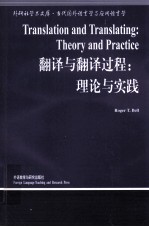图书介绍
翻译与翻译过程:理论与实践PDF|Epub|txt|kindle电子书版本下载

- (英)贝尔(Bell R.T.)著 著
- 出版社: 北京:外语教学与研究出版社
- ISBN:7560085296
- 出版时间:2012
- 标注页数:307页
- 文件大小:12MB
- 文件页数:345页
- 主题词:
PDF下载
下载说明
翻译与翻译过程:理论与实践PDF格式电子书版下载
下载的文件为RAR压缩包。需要使用解压软件进行解压得到PDF格式图书。建议使用BT下载工具Free Download Manager进行下载,简称FDM(免费,没有广告,支持多平台)。本站资源全部打包为BT种子。所以需要使用专业的BT下载软件进行下载。如BitComet qBittorrent uTorrent等BT下载工具。迅雷目前由于本站不是热门资源。不推荐使用!后期资源热门了。安装了迅雷也可以迅雷进行下载!
(文件页数 要大于 标注页数,上中下等多册电子书除外)
注意:本站所有压缩包均有解压码: 点击下载压缩包解压工具
图书目录
Part 1:MODEL1
CHAPTER 1 Perspectives on translation3
1.1 What is translation?4
1.1.1 Equivalence:semantic and stylistic6
1.1.2 Rules:description and prescription10
1.1.3 Translation;process and product12
1.1.4 Summary14
1.2 What is a translator?14
1.2.1 Memory,meaning and language15
1.2.2 The communication process17
1.2.3 The translation process20
1.2.4 Summary21
1.3 What is translation theory?21
1.3.1 Theories,models and analogies23
1.3.2 Requirements for a theory of translation26
1.3.3 Methodology;investigating translation28
1.3.4 Summary31
1.4 Conclusion32
CHAPTER 2 Translating;modelling the process35
2.1 The translator:knowledge and skills35
2.1.1 Ideal bilingual competence38
2.1.2 Expertise39
2.1.3 Communicative competence41
2.1.4 Summary42
2.2 Translating:the model43
2.2.1 Components and processes44
2.2.2 Analysis45
2.2.3 Synthesis58
2.2.4 Summary60
2.3 Using the process to translate60
2.3.1 Analysis:reading the source language text62
2.3.2 Preparing to translate68
2.3.3 Synthesis;writing the target language text71
2.3.4 Summary75
2.4 Conclusion75
Part 2:MEANING79
CHAPTER 3 Word- and sentence-meaning83
3.1 Word-meaning:three approaches84
3.1.1 Reference theory84
3.1.2 Componential analysis87
3.1.3 Meaning postulates91
3.1.4 Summary94
3.2 The thesaurus95
3.2.1 Lexical and semantic fields97
3.2.2 Denotation and connotation98
3.2.3 Semantic differential100
3.2.4 Summary102
3.3 Sentence-meaning103
3.3.1 Words and sentences103
3.3.2 Utterance,sentence and proposition106
3.3.3 Situation,context and universe of discourse110
3.3.4 Summary114
3.4 Conclusion114
CHAPTER 4 Logic,grammar and rhetoric117
4.1 Cognitive meaning,ideational function and TRANSITIVITY123
4.1.1 Participants and processes123
4.1.2 Circumstances127
4.1.3 Logic and the translator129
4.1.4 Summary133
4.2 Interactional meaning,interpersonal function and MOOD134
4.2.1 Communicative exchanges and clause options137
4.2.2 Chain and choice:phrase options141
4.2.3 Grammar and the translator145
4.2.4 Summary147
4.3 Discoursal meaning,the textual function and the THEME system148
4.3.1 Organizing information;text structure149
4.3.2 Thematization150
4.3.3 Linking clauses:textual cohesion154
4.3.4 Rhetoric and the translator156
4.3.5 Summary158
4.4 Conclusion158
CHAPTER 5 Text and discourse161
5.1 Standards of textuality163
5.1.1 Cohesion and coherence164
5.1.2 Intentionality and acceptability167
5.1.3 Informativity,relevance and intertextuality167
5.1.4 Summary171
5.2 Speech acts and the co-operative principle172
5.2.1 Components and rules174
5.2.2 Indirect speech acts178
5.2.3 The co-operative principle181
5.2.4 Summary183
5.3 Discourse parameters184
5.3.1 Tenor186
5.3.2 Mode188
5.3.3 Domain190
5.3.4 Summary195
5.4 Conclusion196
Part 3:MEMORY199
CHAPTER 6 Text processing201
6.1 Text-typologies202
6.1.1 Formal typologies203
6.1.2 Functional typologies203
6.1.3 Text-types,forms and samples204
6.1.4 Summary206
6.2 Text processing:knowledge206
6.2.1 Syntactic knowledge207
6.2.2 Semantic knowledge208
6.2.3 Pragmatic knowledge209
6.2.4 Summary211
6.3 Text processing:skills211
6.3.1 Problem-solving and text-processing214
6.3.2 Synthesis:writing219
6.3.3 Analysis:reading222
6.3.4 Summary226
6.4 Conclusion226
CHAPTER 7 Information,knowledge and memory229
7.1 Human information-processing230
7.1.1 Three stages231
7.1.2 Three processes234
7.1.3 Five demons235
7.1.4 Summary239
7.2 Knowledge240
7.2.1 Conceptual categories and entries241
7.2.2 Encyclopedic entries245
7.2.3 Schemas248
7.2.4 Summary254
7.3 Memory systems254
7.3.1 Episodic and conceptual memory255
7.3.2 Addressing systems256
7.3.3 Recall from memory258
7.3.4 Summary263
7.4 Conclusion263
CHAPTER 8 Envoi267
Appendix269
Bibliography275
Index286
文库索引299